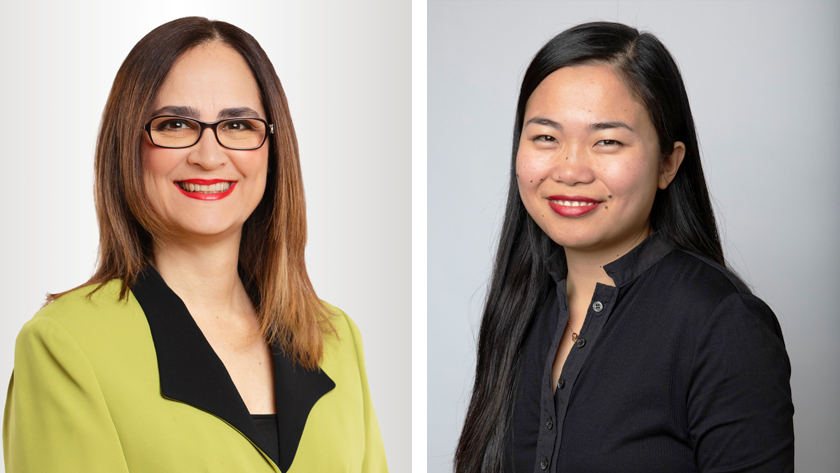
The COVID-19 pandemic has changed how we live and work. This is particularly true for health care workers, who have had adapt to countless staffing and practice changes in the wake of multiple waves of COVID and the rise of new variants.
The pandemic has also increased burnout and feelings of hopelessness in these workers, who are expected to meet daily pressures while synthesizing new information and putting it into practice.
A program at UHN, known as ECHO Ontario: Managing COVID-19 in the Community (ECHO COVID), was developed to address this issue. “The ECHO COVID program is like a high-speed internet connection for expertise—a medium for transferring knowledge and skills quickly across vast distances and among professionals with different levels of expertise,” says Dr. Andrea Furlan, a staff physician at UHN and a Senior Scientist at the KITE Research Institute.
Dr. Furlan led a recent study to assess the effectiveness of the ECHO COVID program. Her team’s findings revealed that health care workers that participated in the program were highly satisfied with it and gained confidence in their abilities to carry out COVID-19-related tasks.
The ECHO COVID program was launched at UHN in July 2020 and the goal of the program was to provide up-to-date and evidence-based COVID-19, policy and practice information. The program entailed weekly one-hour virtual sessions that were free and open to all Ontario health care workers. Sessions featured lectures from experts in diverse fields (e.g., infectious disease, internal medicine, pharmacy, and social work), as well as presentations from patients to provide unique perspectives.
To assess the effectiveness of their program, Dr. Furlan and her team conducted a study that combined different approaches (i.e., mixed methods) to assess three key factors: 1) how the program affected participants’ self-efficacy (ie, confidence in their ability to carry out tasks); 2) their satisfaction with the program and 3) what they thought about the experience as participants.
“During such stressful and uncertain times, we were particularly curious to see whether our program could impact health care workers’ self-efficacy. We know from research that increases in self-efficacy have been linked to behaviour change, reduced worker burnout and ultimately better outcomes for patients,” says Jane Zhao, the first author of the study and a Research Associate at the KITE Research Institute.
In total, the team analyzed responses from 114 questionnaires and conducted one virtual focus group. Self-efficacy was assessed using 17 questions related to different aspects of patient triage, assessment and management and scored on a scale from 1 to 7. After participating in ECHO COVID, median self-efficacy scores increased from 4.7 to 6. The greatest gains in self-efficacy involved managing patients with COVID-19 in the community, specifically those who were hospitalized and released, those who were pregnant or individuals with substance use disorders—for these tasks, the median self-efficacy score increased by two points.
During the focus group, participants described their individual perspectives on the care that they provided during the COVID-19 pandemic and discussed the knowledge that they gained by attending ECHO COVID. Surprisingly, the results revealed that the shift to virtual care was found to be one of the enablers for the program’s success. One family doctor who has been in practice for almost 50 years said, “It’s actually one of the advantages of the pandemic because I’m working from home more, so can schedule around the time of the ECHO. And when I was in office more, I wouldn’t have had the time to do that.”
In summarizing the findings, Dr. Furlan concludes, “Innovative virtual solutions like ECHO represent a silver lining to the pandemic. By enabling health care workers to easily share ideas and expertise virtually, these programs accelerate learning so that they can quickly adapt to challenging situations and ultimately provide better care to patients.”
There are currently 30 Project ECHO programs active in Ontario. To learn more, visit www.echoontario.ca.
This work was supported by the Ministry of Health, the Ministry of Long-Term Care, and the UHN Foundation. Dr. Furlan is a co-Chair of ECHO Ontario for Pain and Opioid Stewardship, and a Scientist at the Institute for Work & Health.
Zhao QJ, Rozenberg D, Nourouzpour S, Orchanian-Cheff A, Flannery J, Kaul R, Agbeyaka S, Barber M, dePeiza P, Doumouras AM, Draper H, Gebara N, Lau J, Liberman D, Luther RA, Sanh M, Furlan AD. Positive impact of a telemedicine education program on practicing health care workers during the COVID-19 pandemic in Ontario, Canada: A mixed methods study of an Extension for Community Healthcare Outcomes (ECHO) program. J Telemed Telecare. 2021 Dec 28. doi: 10.1177/1357633X211059688.

(L-R) Senior author of the study Dr. Andrea Furlan, and first author of the study Jane Zhao.




